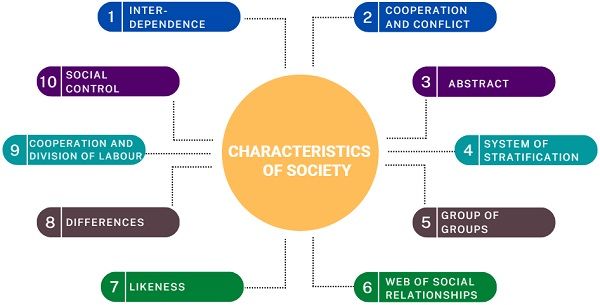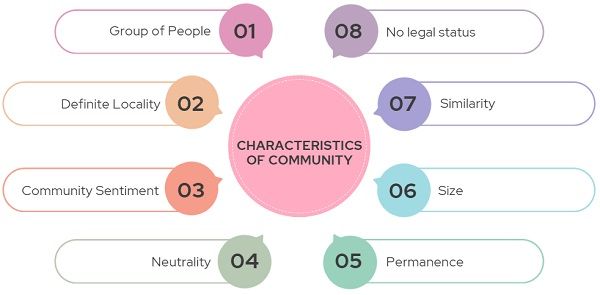 We all know that man is a social animal who depends on others to fulfilling basic needs. Due to the continuous interaction between people, they become mutually dependent on one another.
We all know that man is a social animal who depends on others to fulfilling basic needs. Due to the continuous interaction between people, they become mutually dependent on one another.
While a community is an organically functioning, mutually interdependent system, society is a natural, externally organized group. A community and society are not static, as they keep on changing.
The difference between society and community relies on the individual’s role. A community is formed and functions due to people’s interdependence. However, an individual’s role in society is restricted by their formal roles and not role relationships. In a community, every individual is aware of the fact that he has to play a certain role. The role can be any role, i.e., a farmer, shopkeeper, teacher, makeup artist, etc.
Content: Society Vs Community
Comparison Chart
| Basis for Comparison | Society | Community |
|---|---|---|
| Meaning | Society is a large grouping of individuals and the relationship existing between them. | Community is a geographic area of social living, having some degree of social coherence. |
| Members | Diverse | Same |
| Nature | Abstract | Concrete |
| Awareness about lifestyle | Yes | No |
| Relationship | Web of social relationship | We-feeling among people |
| Geographical area | Not confined to a particular territory or geographical area. | Confined to a particular territory or geographical area. |
| Strong sentiment | Not present | Present |
What is Society?
Society is a formal association of people with common interests. They are associated with each other through persistent relations, or they share the same geographical or virtual territory. It implies the pattern of social relationships between individuals who have different institutions and cultures. It comprises like-minded people who possess their own values and norms.
In short, society is a large grouping of people with a common or distinct culture, living in a specific geographic area, feeling belonging and possessing all the essential social arrangements important for sustaining life.
Characteristics of Society
- Inter-dependence: The members of society depend on each other for its smooth functioning in day-to-day life. For example, carpenter, cobbler, plumber, and sweepers perform their tasks, yet they depend on one another. This is because one person cannot perform their tasks solely.
- Cooperation and Conflict: Society continues to exist until members cooperate with one another. It is present at every level of society, such as:
- Between family members
- Between neighbours
- At the level of wider society
However, there exists an element of conflict, and that is also a part of the relationship. It occurs when the interest of the members oppose each other.
- Abstract: Social relationships can only be felt, i.e. one cannot see or touch them. Society is a process of associating with people.
- System of stratification: Members of the society differ in their status and class, such that every individual has a recognizable position in society.
- Group of Groups: People come together to create groups. When these groups are taken together, they form a society. Every society consists of families, neighbours, villages, cities, associations, political parties etc.
- Web of social relations: People reciprocate with each other. It has a wide range of social relationships like teacher-student, lawyer-client, husband-wife, etc.
- Likeness: Members of society share similarities regarding their needs, works, aims, ideals or values. Due to these similarities, people interact with one another and live peacefully. Society never comes into being if there is a lack of likeness.
- Differences: Apart from the similarities, there are natural differences also among the people with regard to interest, talent, ability, intelligence, etc. That is why you can see labourers, advocates, engineers, lawyers, etc., in working capacities. The members of society differ with regard to caste, class, occupation and education.
- Cooperation and Division of Labour: Cooperation of various elements of society is necessary for the growth of culture and civilization. The division of labour relies on the interest of people, ability, gender and age to ensure efficient task performance.
- Social control: There are a number of rules, customs, traditions, legislation and principles that regulate the behaviour of the members of the society.
Advantages of Society
- It helps people learn how to cooperate with each other.
- Encourages teamwork
- It teaches sharing and caring
- Establishes rules for a standard behaviour for peaceful living.
- Maintains a balance between independence and interdependence.
Also Read: Difference Between Culture and Society
What is Community?
A community is a system of human beings organized for the purpose of serving together. The fundamental characteristic of a community is that all a person’s social relationships may be found within it. In a community, the personal identity of people becomes a part of the collective identity. It can unite people in a common thread.
In short, a community is the completely organized life of a locality. It is the system in which the members of a group live together in a geographical area so that they share the basic conditions of a normal life.
A community is a social unit that has something in common, which could be religion, values, profession or even norms. They share a sense of place, i.e. people living in a specific geographical area or a virtual space having channels of communication.
What is a Virtual Community?
The creation of a virtual community takes place by means of online interaction. They share information with a specific aim.
Characteristics of Community
- Group of People: There is always a group of people that forms a community. It is a collection of individuals related to the locality. Further, the group could be large or small.
- Definite Locality: Community is an areal group, i.e. the group lives in a specific territory.
- Community Sentiment: Community sentiment must be present in the minds of people. That means there must be a ‘we’ feeling in the people’s minds. This usually occurs because living in a particular area for a very long time often creates a sentiment of common living among its members. Community members possess strong sentiments towards their community.
- Neutrality: Community forms naturally over a period of time. The creation is neither out of the act of government nor according to the wishes of humans. This means it takes birth spontaneously.
- Permanence: A community is a permanent group within a particular geographical area. It is not a temporary group like a crowd or mob.
- Size: The community has no size; it could be big or small. That means a village has a small community, whereas a city has a large community.
- Similarity: Community members have many things in common such as they live similar lives and have some common ends. Moreover, there is a similarity in language, culture, traditions, ideology, etc.
- No legal status: A community is not a legal person. Therefore, it does not have any rights or duties in the eyes of the law.
Also Read: Difference Between Communism and Socialism
Key Differences Between Society and Community
- Society is a group of people living in a certain geographic area who interact with each other and share a common culture. On the other hand, the community is a name of a settlement, village, tribe or nation. When persons live together on a particular territory and have feelings of mutuality for each other. Further, they develop various types of relationships among themselves.
- In a society, the members are diverse as it comprises various communities. Whereas in a community, members share common characteristics, so they are quite similar to each other.
- Society is abstract, but the community is concrete. This means the community exists physically. But, society can only be realized. It does not exist in reality but only in people’s minds.
- In a society, people are aware of their lifestyles or, say, social life and have a common purpose in life. They are also emotionally integrated. Conversely, in a community, people are not aware of their lifestyles and life purposes. They lack cohesiveness and emotional integration.
- Society is a web of relationships existing among individuals. On the contrary, community implies a group of individuals residing within a certain territory, with some extent of we-feeling.
- Society is not confined to any locality or geographical area. But, the community is always concerned with a specific locality.
- People belonging to a community have a community sentiment, without which a community does not come into existence. However, society focuses more on the organization.
Conclusion
All in all, in a society, the interaction among members is the primary element, as it controls the connections between networks of people. As against, in a community, interaction among members takes place in an involuntary manner, as people have many common traits.








Leave a Reply